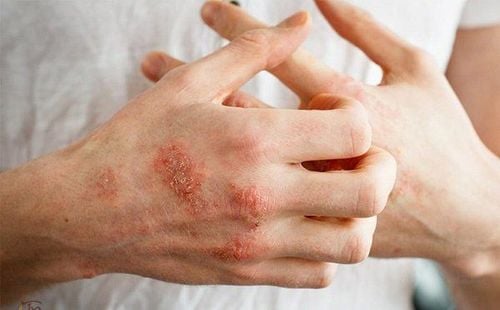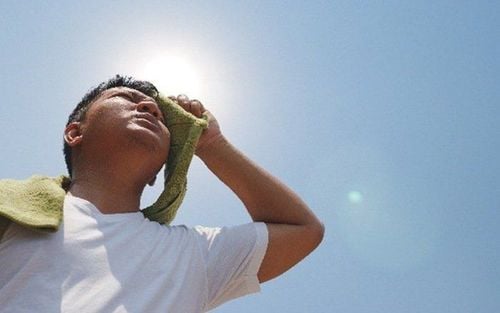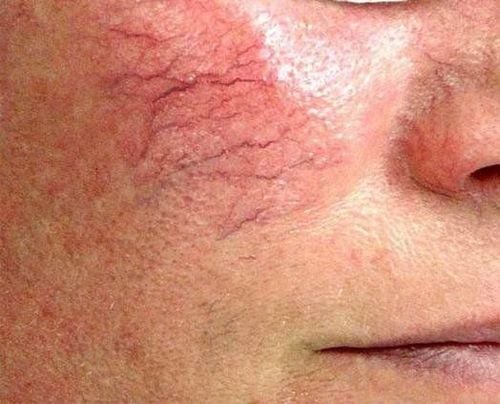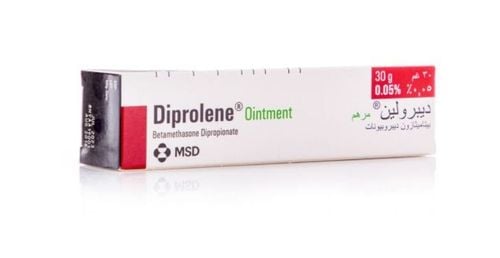This is an automatically translated article.
Eczema or eczema is a dermatological disease with complex etiology and pathogenesis. This is a group of diseases that cause dermatitis with characteristic symptoms including inflammation, rash and itching. What causes eczema? Join us to dig deeper into the content below
1. Learn about Eczema Eczema is a fairly common skin condition, but the exact cause is unknown. However, risk factors for eczema have now also been identified. Limiting these risk factors will help prevent and control the disease better.
Eczema can affect people of any age, but it occurs more often in young children, especially those under 5 years of age. Therefore, parents should pay attention to the signs of illness in their children, detect and treat them early. The main manifestation of eczema is an inflammatory skin condition called papules, blisters, causing itching and discomfort for the patient.
1.1. What is Eczema? Along with atopic dermatitis, eczema is also one of the most common skin diseases. Eczema is also known scientifically as Eczema with its origin from the Greek word Eczeo, which refers to the lesions as blisters. In folklore, this disease is often called eczema because of repeated injuries that make the skin rough with deep sucking holes oozing yellow water like a leech's mouth.
According to the scientific definition, eczema is an inflammatory state of the superficial layer of the skin in both acute and chronic forms, with a rather complicated course. Eczema rashes can appear anywhere on the body, but they can often appear on certain parts of the body (depending on a person's age).
In infants and children: Eczema usually appears on the face, chest and back of the scalp (because these are the areas that young children often scratch). Eczema rarely occurs in the diaper area. Parents should closely observe signs of children with eczema to promptly handle. In older children and adults: Eczema often flares up strongly on the elbows or back of the knees. It is also common on the face, eyelids, hands and feet, especially in adults. Eczema can occur at different ages, in which the following groups of people will have a higher risk of disease than the general population:
Newborns have low resistance Children playing in dirty environments, not are clean The subjects do housework and often have to come into contact with cleaning agents. People who are sensitive to weather and easily irritated by external influences People who have a family member who has a history of eczema. Although eczema is not life-threatening, if it is not completely treated, it can lead to some unpredictable complications such as:
Infections on the skin: The lesions are not completely healed, causing The disease recurs many times, creating favorable conditions for bacteria, especially Staphylococcus aureus to form. Fungal infections Exfoliative dermatitis Eye problems such as: Blepharitis, conjunctivitis, cataracts and retinal detachment, vision loss Sleep disturbances: One of the most dangerous complications of eczema It is a sleep disorder that causes mental decline. Asthma and allergies are also among the common complications seen in people with eczema.

Nguyên nhân gây bệnh chàm được nhiều người quan tâm
1.2. Is eczema contagious? This is a question many people are interested in because eczema is a skin disease. However, based on actual studies, eczema is unlikely to be transmitted by casual contact, with little transmission from one skin area to another. Therefore, patients should not be too self-deprecating, afraid to contact others when they are sick.
Instead, to protect your eczema-prone skin, when going out, the patient should take protective measures to limit the superinfection and especially after applying the medicine. Besides, you also need to build, implement a reasonable diet and rest to strengthen the resistance because one of the causes of eczema is due to the weakening of the immune system. In addition, the choice of a radical treatment method is also essential to prevent the growth and spread of diseased skin areas.
2. Eczema causes and ways to prevent 2.1. Certain chemicals Certain chemicals can irritate and worsen eczema symptoms. So to help prevent eczema you should take some steps when dealing with chemicals:
Wear cotton-lined gloves Do not use air fresheners, perfumes or scented candles. Stay away from smoke.
2.2. Hot water Frequent use of very hot water is one of the causes of eczema. If your job requires daily exposure to hot water, you should apply moisturizer regularly.
Showering with water that is too hot can be rough on the skin and cause irritation. This damages the body's protective barrier.
If you must take a hot bath, you should apply oil to your skin first to protect your skin and only take a hot bath for a short time.
2.3. Sun, sweat and sunscreen Sunlight can cause your skin to sweat and become irritated. Therefore, you should limit going out in the sun during times of high UV rays. Maintain the habit of using sunscreen. Sunburns can cause your skin to become inflamed and flare up symptoms of eczema.
If you are sensitive to sunscreen, block the rays with minerals, such as zinc oxide or titanium dioxide. Facial sunscreens can also give you gentle protection.
People with eczema need sun protection just like everyone else, but this step is often skipped for fear of flare-ups. The National Eczema Association recommends a broad-spectrum, mineral-based (physical) sunscreen with SPF 30 or higher. Common key ingredients in physical sunscreens include titanium dioxide and zinc oxide.

Mặt trời, mồ hôi có thể là nguyên nhân gây bệnh chàm
2.4. Some clothing Wool and mohair materials can cause itchy skin. Certain synthetic materials like polyester, nylon, and rayon can make you sweat. Under the influence of these materials, the symptoms of eczema will become more severe.
Therefore, to limit this eczema trigger, you should wear loose, breathable cotton clothes. Also, you should wash your clothes before wearing them to help remove the dyes or chemicals used to keep them wrinkle-free at the store.
2.5. Detergents, soaps and shampoos These are chemicals that can negatively affect your skin, causing eczema. Therefore, you should choose laundry detergents for babies or sensitive skin, like fragrance-free. Scented fabric softeners and linens should not be used. Choose a shampoo that is benign, safe for the skin and has a neutral pH, no fragrance.
2.6. Stress Stress and anxiety can make skin conditions like eczema worse. When you're stressed, the stress hormones in your body cause inflammation that irritates the skin. Stress can be harmful to your body and can even lead to eczema flare-ups, notes Dr. Sarkar: "Most diseases, skin and otherwise flare up when stressed. This is especially so. true for inflammatory diseases like acne, psoriasis, and eczema."
Even physical stress, such as when you are fighting a cold, can have consequences. So take good care of yourself and make it a habit to get enough sleep, relax with yoga, meditation or deep breathing exercises.
This looks different for everyone. Some people enjoy yoga or meditation, others enjoy hiking or intense cardio. Dr. Sarkar says figure out what lowers your cortisol levels and focus on that a little bit each day.
2.7. Allergies If you are allergic to pollen, pet dander, dust mites, and mold, try to stay away from them. Vacuum regularly and wash bedding weekly in hot water. If possible, remove thick curtains and rugs.
Staying away from allergens can help prevent eczema flare-ups. “Allergens actually aggravate eczema,” warns Dr. Sarkar. "Patients with eczema are more likely to have allergies to other things such as pets, pollen, dust or foods. Exposure to allergens, especially in high or long-term doses, tends to eczema flare-ups, so I recommend avoiding them as much as possible."
2.8. Sensitivity to certain foods Research shows that certain foods can make eczema worse - especially for babies and children. Peanuts, milk, soybeans, wheat, fish and eggs are all the most common culprits.
2.9. Dry air When it comes to dry skin, introducing a humidifier to your home and/or office can be a real game changer for people with eczema. “Especially in the colder months, wind and dry heat can affect the skin,” says Dr. Zeichner. "Using a humidifier can help restore moisture to another layer of skin, keeping it in its best state possible even while you sleep."
In winter, the fireplace is the cause of your skin becoming rough. Experts recommend that you take care of your skin to help keep your skin moisturized and prevent eczema.

Căng thẳng và lo lắng có thể làm cho tình trạng da như bệnh chàm trở nên tồi tệ hơn
2.10. Exercise and sweat Exercise is good for you and can relieve stress. But exercise-induced sweating can worsen skin problems. To keep cool, take breaks during your workout, don't wear tight clothing, and drink water when it's hot. Try exercising indoors or at cooler times of the day. Swimming is also beneficial for your skin, but be sure to shower and moisturize afterwards as the chlorine in the water can be irritating.
Eczema causes negative effects on the patient's quality of life as well as aesthetics. Therefore, proactively preventing and treating this disease early will help you comfortably enjoy life and be confident in communication.
At Vinmec International General Hospital, there is a package of examination and advice on treatment of atopic dermatitis to help customers assess the overall condition of the disease and advise on measures to help prevent recurrence.
When registering for a package of examination and consultation for treatment of atopic dermatitis, customers will receive: Dermatology specialist examination. Perform tests such as: quantitative IgE, fresh mycobacteria, specific IgE quantification with respiratory allergens - food (Panel 1 Viet), test Rida Allergy Screen (panel 1)...
Please dial HOTLINE for more information or register for an appointment HERE. Download MyVinmec app to make appointments faster and to manage your bookings easily.
Reference source: webmd













